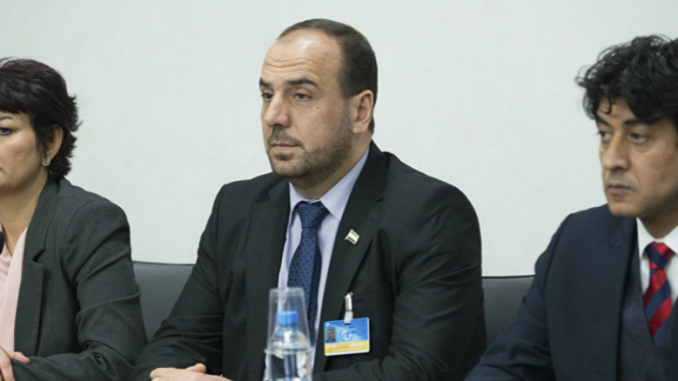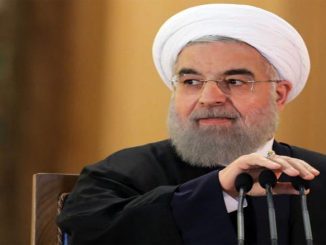
The Syrian opposition faced the reality of the US’ position on the Syrian crisis that sees ousting Assad as not a priority anymore, what puts more pressure on the opposition and threatens to shatter the Syrians demands in political transition.
The Syrian crisis began as a peaceful demonstration against the injustice in Syria. Assad regime used to fire power and violence against the civilians and led to armed resistance. 450.000 Syrians lost their lives in the past five years according to UN estimates, and more than 12 million have lost their homes.
The Assad regime forces, backed by Russian air power, Iranian ground forces and Shi’ite militia fighters from Iran, Iraq, and Lebanon, has been tightening its grip on rebel-held districts around Syria, and together they committed crimes against the Syrian civilians to force the rebels to surrender.
After the Obama administration gave the Syrian civilians hope by saying that Assad should leave and he must be tried for his crimes, the civilians were later gravely disappointed when Obama care kept watching them being killed.
The Syrian opposition has also demanded that Assad must step down and called for a political transition to be the ultimate solution for the crisis, while asking the US to have a firm stance and use its influence to achieve these goals.
However, the little hope that the Syrians had in an international intervention has vanished after Trump became the president because he first said that Assad is a partner in fighting the terrorism that ISIS resembles, then lately saying that ousting Assad is no longer a priority for the US.
Assad can remain in power
The United States’ diplomatic policy on Syria, for now, is no longer focused on making Bashar al-Assad, leave power, the U.S. ambassador to the United Nations said, in a departure from the Obama administration’s initial and public stance on Assad’s fate.
On Thursday, both Secretary of State Rex Tillerson and Nikki Haley, the U.S. ambassador to the United Nations, let it be known that the United States no longer seeks Assad’s ouster.
“You pick and choose your battles and when we’re looking at this, it’s about changing up priorities and our priority is no longer to sit there and focus on getting Assad out,” U.S. Ambassador Nikki Haley told a small group of reporters.
“Our priority is to really look at how do we get things done. Who do we need to work with to really make a difference for the people in Syria?” Haley said.
“We can’t necessarily focus on Assad the way the previous administration maybe did. Do we think he’s a hindrance? Yes,” she said.
“Are we going to sit there and focus on getting him out? No.”
US Secretary of State Rex Tillerson backed Haley’s statement, saying that Assad’s future is up to the Syrian people to decide.
“I think the … longer-term status of President Assad will be decided by the Syrian people,” Tillerson said
Tillerson is due in Moscow next month for talks with Russian leaders, and Trump has long argued the powers should work together against ISIL.
White House spokesman Sean Spicer said that regarding Assad, “there is a political reality that we have to accept in terms of where we are right now.”
Spicer blamed the inability of Trump’s predecessor, Democrat Barack Obama, to persuade Assad to step down.
“We had an opportunity and we need to focus now on defeating ISIS,” Spicer said. “The United States has profound priorities in Syria and Iraq and we’ve made it clear that counterterrorism, particularly the defeat of ISIS, is foremost among those priorities.”
Syrian opposition facing the reality
The view of the Trump administration is also at odds with European powers, who insist Assad must step down, and backed the Syrian opposition, at least with speeches, to achieve this goal.
The third round of Syrian peace talks in Geneva ended with an agenda that paves the way for the political transition, the opposition’s central goal – based on three subjects: accountable governance, a new constitution and UN-supervised elections within 18 months.
A fourth subject was added after pressure from Russia and Assad regime, which is fighting terrorism.
The opposition said in the latest peace talks that “we will only accept the departure of Assad, and will not rest until we put the perpetrators of crimes in Syria to justice.”
However, the US latest declarations put this demand under suspicion, as its support is needed against Russia’s influence and Assad regime’s manipulations.
Opposition figures reacted furiously to the US shift in stance.
“The opposition will never accept any role for Bashar al-Assad at any phase,” said Monzer Makhos, a spokesman for the High Negotiations Committee, which represents the opposition in negotiations over Syria’s war.
“There will be no change in our position,” he warned.
However, Farah al-Atassi, a Syrian opposition member, said that The U.S. State Department and the White House are sending contradictory messages on Syria and should start leading and not focus exclusively on fighting Islamic State.
Atassi told reporters in Geneva that the United States should put pressure on Russia and see the Syrian rebels as a reliable partner against terrorism, meaning not only Islamic State but also Iran-backed militias such as Hezbollah and the Iranian Revolutionary Guards.
Atassi said the Syrian opposition had had a very good meeting on Thursday with U.S. Middle East envoy Michael Ratney on the sidelines of peace talks in Geneva, and it had valued the United States as a partner and “ally” over the past six years.
But she said recent U.S. announcements were contradictory.
“We heard the spokesman for the White House contradict what Tillerson just stated today in Turkey. They clearly said Assad has no role in the transitional period. So it’s unfortunate that we are hearing such contradicting messages from the U.S. administration,” she said.
“We would like to see a more decisive role and leadership on the Syrian file, not to see the Syrian file only through the eyes of fighting ISIS.”
Atassi’s statement reflects that the Syrian opposition still believes in the US in solving the Syrian crisis, forgetting that it is the US who made Russia and Iran expand their influence over Syria’s present and future by failing to do its commitments to its “Syrian allies”.
“To suggest that Assad is an acceptable leader for the Syrian people is to ignore the wholesale slaughter of the Syrian people by the Assad regime. Leaving him in power is also a great reward for Russia and Iran,” a US senator said addressing the real situation.
The Syrian opposition should be aware of this fact too and be expecting the changes on the ground that these latest declarations will bring. Therefore, tough political games are waiting for the opposition in the coming peace talks, and the ability of opposition delegation to handle them and gather as many supporters and pressure cards as possible will have the greatest effect on deciding Syria’ future.



